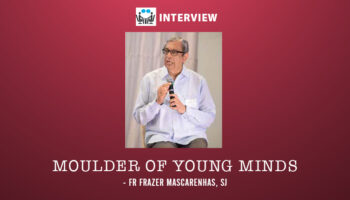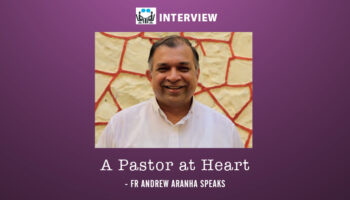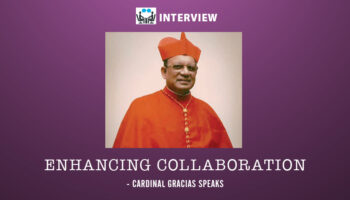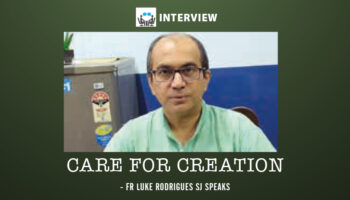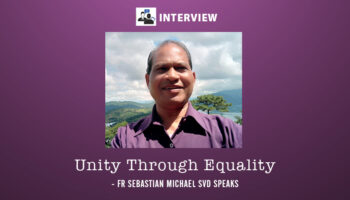We launch this feature with an interview with a very inspiring religious who spent years among the poorest of the poor in Bihar, then worked for them with the government, and was elected superior general of her order. Evidently a woman of God for whom Jesus means much, she has much to teach us.
Recently you addressed the Meeting of the Superiors General of women
religious in Rome. What points did you insist on?
In May this year, I was privileged to address the International Union of Superiors General in Rome on the theme: “Solidarity for Life on the Periphery.” I found the theme very pertinent, but challenging. Although I touched on several important issues concerning this theme, my emphasis was on the following three points: spirituality, the context of our mission today and our call to a culture of solidarity.
I believe that the fundamental pre-requisite for living solidarity on the peripheries in the spirit of Jesus is our rootedness in the heart of God and in the realities of our world: being women and men in pursuit of spiritual depth and soul-vision. Jesus always found time to be with his Abba in quiet contemplation and solitude. If we believe our call is to be Christ to the world today, then our model can be none other than Jesus, who was profoundly contemplative and, at the same time, intensely human. His ministry was characterized by many radical and prophetic options that placed him on the margins. His life and mission was all about relationships. This sustained, divine intimacy is the fundamental requirement for each of us as religious to engage with one another in solidarity, and to move to the peripheries with the heart and mind of Jesus.
In my UISG talk I often referred to Pope Francis, the Pope of the peripheries! With a sense of urgency, he continues to call us to re-image religious life and mission in a radical way and find our true identity on the peripheries with the peripheralized people. How right he is when he says this is what will get us and the whole Church out of our “self-absorption.” It is time for each of us as Religious to put our heads and hearts together to search for a new way of being religious, a new way of engaging with the world. I believe that the poor will continue to lead us to the heart of our mission, to where we belong and, indeed, to the very heart of God.
Another important point that I highlighted was Solidarity across congregational, cultural and geographic boundaries. Genuine solidarity requires heart-level understanding of our prophetic call and a radical commitment to the Jesus movement for the integral liberation of every human person. Today, you and I are challenged to identify and cross over the tightly held, comfortable boundaries of our religious life and move to the peripheries. Risking some periphery-focused questions can lead to the essence of true solidarity.
Tell us something about your own journey of faith—from your childhood until now. Who has (have) inspired and influenced most? What drew you to religious life?
It was in my deeply religious family that God provided me with roots and wings that continue to hold and ground me and to sustain me in my journey of faith. What I learned from my saintly mother and father and the witness of their faith in action are foundational to my own relationship with God and with others and my life as a religious. My earliest memories are so much centered around the beautiful way my mother taught us to ”talk” to Jesus as our closest friend and guide. Hers was a spirituality of relationship. There was a very transparent and credible integration of the divine and the human in her life of faith and action.
Witnessing is not about what we say or do; it is more about who we are and how we live. Among the many Christian values inculcated in us by our parents, there was great emphasis on a life of prayer, forgiveness and compassionate love for the poor. These values continue to guide my life. How true it is that the Gospel, as it is embodied in us, carries much more credibility and power than all our dogmas, reasoning and preaching. Even in the most adverse situations, we can always witness to the message of Jesus by embodying it in our lived reality.
My attraction to Religious life came from a sustained inner desire to offer my life to Jesus, especially by serving the poor and needy in some remote place where not many people want to go. In addition, my parents and my close relatives who were happy and committed missionaries had a great influence on my decision to become a missionary.
You worked among the poorest and most marginalized groups of people in Bihar. What led you to do that?
Although from my very young age I had persistent dreams about living with the marginalized and sharing their life, it was only when, as a young Sister, I pitched my tent among one of the most deprived groups of Dalits in Bihar, along with my two companion Sisters, that my eyes were opened about the implications of my call to mission on the peripheries. Until and unless we touch, smell and feel real poverty, it is not possible to enter the world of the poor. For me, incarnation takes on a whole different meaning when we are with the poor. During the initial phase of our life with the poor, we went from house to house, meeting the poor, listening to them, eating whatever they could offer us, sleeping in any little space that was made available for us. We had no agenda except that of establishing relationships with the people. The longer we lived among them, the more realized that these relationships lead to mutual transformation and engagement with the poor in their struggle for integral liberation.
My life experiences with the poor changed my own understanding of my call to religious life, community and mission. As a small community inserted among the poor, we developed a pattern of regular prayerful reflection on the meaning and the consequences of living our consecrated life in our present context; in the Gospels, we always found the answer. It was this experience that gave us the inner freedom to keep going forward although we lacked even the very basic facilities like clean drinking water, toilets, bathing facilities, a little room of our own, electricity and such things which are considered the basic necessities of daily living. I believe that if all of us religious, especially those called to leadership, would risk sharing the lot of the poor, even once in a while, it would nurture compassion in us and propel us to work for justice and peace in the spirit of solidarity from a new perspective.
What lessons did you learn from this experience?
Sharing the lot of the poor day after day can, indeed, be a powerful eye-opener for us who take it for granted that having middle class (or even higher!) comforts and conveniences are our right, part of our promised hundredfold, because we have left everything for the sake of Jesus! What have we really left behind and for whom?
The poor have rich inner resources that can touch and transform us, if we are willing to learn from them. The poor who live in the most hopeless situations have the best definition of hope, compassion and solidarity. From their inner resources, they seem to cope with what could otherwise be devastating. Sharing the life of the poor will impact our prayer life, our spirituality, lifestyle, and our understanding of community and mission. My lived experience among the marginalized people in Bihar has helped me to understand better the Gospels and my consecrated life from their perspective. This experience has made a radical impact on my convictions, priorities and commitment as a Religious. The options before us are very limited: either we live a prophetic religious life with all its consequences of witnessing to the life and mission of Jesus in real terms, or we disappear as an irrelevant reality.
You were superior general for twelve years. Any tips for major superiors in India today?
One of the things I believe is a great need today is to model participative, servant leadership. I began my ministry of Congregational leadership with five councillors and several other sisters in the administration who represented various cultures and nationalities, none of whom I knew. The first thing we did was to begin the process of becoming a leadership team. In the first week of our taking charge, we set aside three days to be together in quiet prayer and solitude, to contemplate our new call to serve. Then, the next two days were spent in getting to know one another by sharing our stories, our lights and shadows, our spiritual journey, our hopes and dreams as we entered into the new leadership ministry. By then, we were already experiencing a sense of bondedness and energy among us.
We then spent another day to write our personal vision statement as congregational leaders. The final part of the process was to merge together our individual vision into a shared, integrated vision based on the current realities of the Congregation, the Church and the world. In retrospect, I can clearly see that the whole experience of that week was the beginning of an apostolically vibrant leadership team. Establishing a pattern of regular team meetings for sharing our ”God-moments” and for reflection on our ministry and issues connected with it, from the beginning impacted our ministry effectiveness, spiritual growth, shared commitment and also provided us with many healthy recuperative experiences.
An important area is the witness of our life. Today we are challenged to be leaders who bear the mark of Jesus, the transformational servant leader, whose integrity, inclusivity and humble attitude drew out the best of vision, creativity, commitment and leadership from his close followers. As leaders, we need to ask ourselves if there is a certain sense of adventure, prophecy, and risk-taking in our style of leadership or we are functioning as mere ’maintenance’ leaders.
Another important question is: Are we preparing those we lead to be contemplatives in action, who will live a prophetic life with all its consequences? How we can awaken and gather together the transformational potential in the hearts our membership is a constant search and concern for those called to leadership.
We need to pay much attention to our leadership style in our drastically changed modern realities. We are called to lead more from the heart than from the head because, at the heart of our leadership, is the person and our mission. Many a time we behave like glorified “CEOs” who are a poor reflection of Jesus, our Servant Leader! Professionalism and even talents can be purchased from the market today, but only an intimate relationship with Jesus can teach us his style of leadership! From Jesus we learn to be “person-centered” and mission-focused leaders.
Congregational leaders need to find creative ways of nurturing a culture of life-giving relationships and solidarity among the membership across congregational and geographical boundaries. It is a time to “widen our tents” and think “outside the box!”
You worked as the State Project Director of the Women Empowerment
Department of the Bihar Education Project for several years. What has been your
experience of working within a Government department?
It was when I was living in a Musahar village that I received an invitation from Shri. Anil Bordia, IAS, the then-Education Secretary, Government of India, asking me to be one of the founding members of the Bihar Education Project, which was funded by the UN and the Government of India. I was introduced to him earlier during a National Literacy Mission Meeting in Delhi. He was a man of extraordinary vision, committed to empowering all, especially women and girls, through quality education.
The thought of moving away from my familiar life with the poor to work within the government’s bureaucratic structures was rather intimidating for me, and I was apprehensive. What helped me to plunge into this totally unknown world was the support of my superiors and sisters, as well as the encouragement of my good friends and the strength of my years of experience with the poor. From the beginning, I could see great possibilities in the project for a much wider involvement with the marginalized, especially women and girls. Working within such a large government project opened many doors for me to get directly involved with the victims of dehumanizing poverty, illiteracy, conflicts, exploitation and marginalization, homelessness, human trafficking, migrants; all these women and girls were our first priority in all these situations.
I was entrusted with the responsibility of establishing the Women Empowerment Programme (Mahila Samakhya) within the Bihar Education Project (BEP). My years of experience in working with the poor, especially women, was a great help in pursuing this task. I felt that my presence and sincere commitment was recognized and valued even by those who did not approve of us “missionaries.” As we worked alongside them, they began to realize that somehow we were different and there was something in us that took us beyond just being “officers.” From the beginning, I promoted mutual accountability in my department by engaging in the reflection-action-reflection process on a regular basis. I had the freedom and the space to contribute my best to the programme, and I felt enriched by the whole experience.
From my experience of being a government employee, I can say that it was a great opportunity to witness to what we stand for and our reason for being Religious. What I learned from this experience is that we religious need to enter into appropriate services in the government sector as well as with other like-minded NGOS; we can be a transforming presence and make significant contributions for the much-desired systemic change. The time has come for us to prepare our younger generation of religious to think beyond our congregational boundaries when it comes to serving God’s people who are most in need.
Are you happy and enthusiastic? What is the secret of your joy and enthusiasm?
I have always been happy and enthusiastic about my life and mission. Along with the Psalmist I want to say, “You have put into my heart a greater joy than abundance of corn and new-wine…” and I have received all that I need to live a happy, committed and fruitful life. Even as a young girl I was fascinated by the “reckless” love, radical inner freedom and simplicity of Jesus. Gradually that fascination was transformed into a personal call to l follow Jesus as a Sister of Notre Dame. I am still struggling to understand and live the greater implications of that call. Even amidst the struggles and challenges of my consecrated life, I continue to experience inner joy and freedom. I think it is impossible to be lethargic and unhappy if we truly love our vocation as Religious and keep our focus on Jesus and his mission! A religious without “fire for Jesus and his mission” is a contradiction in terms.
I always find great joy and hope when I am in the company of those who live their lives with prophetic commitment and vision. As a member of an international congregation with multiple ministry demands, I am not always able to do ministries that I desire the most. But somehow I always find joy and meaning in whatever ministry I am engaged in. When we know that we are at the right place, at the right time, we become enthusiastic and energetic. I am sure there will be more joy and meaning in our life as Religious when we live out of a deeper spirituality, radical simplicity and Gospel poverty and risk a more incarnational involvement with the life struggles of our people on the peripheries.
To subscribe to the magazine Contact Us

